-ant, -ants
(Latin: a suffix; a person who, the thing which; people who, things which)
intolerant (adjective), more intolerant, most intolerant
1. Unwilling to accept differences of opinion.
2. Being narrow-minded about cherished beliefs.
3. Showing an unwillingness or refusal to accept people who are different, or have views, beliefs, or lifestyles that are not the same as one's own; such as, an intolerant society.
4. Easily angered or annoyed: Hank is intolerant of vulgar talk.
5. Unable to thrive or to survive in a particular environment.
2. Being narrow-minded about cherished beliefs.
3. Showing an unwillingness or refusal to accept people who are different, or have views, beliefs, or lifestyles that are not the same as one's own; such as, an intolerant society.
4. Easily angered or annoyed: Hank is intolerant of vulgar talk.
5. Unable to thrive or to survive in a particular environment.
irrelevant (adjective), more irrelevant, most irrelevant
Not important nor relating to what is being discussed at the time: Marina's comments were irrelevant to the subject that was being considered during the project meetings.

© ALL rights are reserved.
Go to this Word A Day Revisited Index

Go to this Word A Day Revisited Index
so you can see more Mickey Bach illustrations.
irritation
itinerant (adjective), more itinerant, most itinerant
1. Relating to a person who travels or wanders from place to place: Homeless people are known to be itinerant rovers.
2. Etymology: from Latin itinerari, "to journey about".
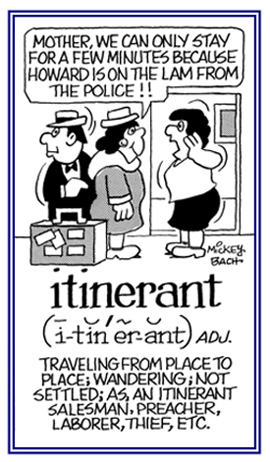
© ALL rights are reserved.
Go to this Word A Day Revisited Index
2. Etymology: from Latin itinerari, "to journey about".

Go to this Word A Day Revisited Index
so you can see more of Mickey Bach's cartoons.
Any substance; such as, oil, grease, silicone, or graphite that is put on parts of machines that slide or move against each another in order to make them work smoothly and easily: When a lubricant is applied, it is done in order to reduce friction between two interacting surfaces.
luxuriant (luhg ZHOOR ee uhnt, luhk SHOOR ee uhnt) (adjective), more luxuriant, most luxuriant
1. Describing something that has an appealingly rich quality: Diane's dress had the most luxuriant colors.
2. Characterising something that has heavy and thick growth: Shirley had luxuriant blond hair hanging down to her shoulders.
3. A reference to a substance which grows in great abundance; relating to a material which is lush or rich: Max had the most luxuriant beard of all the men who were in the competition of those who had whiskers.

© ALL rights are reserved.
Go to this Word A Day Revisited Index

Source is unknown.
2. Characterising something that has heavy and thick growth: Shirley had luxuriant blond hair hanging down to her shoulders.
3. A reference to a substance which grows in great abundance; relating to a material which is lush or rich: Max had the most luxuriant beard of all the men who were in the competition of those who had whiskers.

Go to this Word A Day Revisited Index
so you can see more of Mickey Bach's cartoons.

malignant (adjective), more malignant, most malignant
1. Pertaining to a disease that is characterized by extreme virulence and is exceptionally contagious or infectious: As a patient, Leroy was placed in the isolation ward as a result of the extremely malignant nature of his lung infection.
2. A reference to the tendency of becoming worse and the resistance to medical treatment; pertaining to cancerous development: Given the malignant nature of the growth in the Bill's stomach, the doctor was recommending radical surgery.
3. Relating to or referring to a threat to produce death; harmful; virulent: The term malignant primarily describes such ailments as a tumor which spreads from its original location to affect other areas of the body with potentially life-threatening results.
4. Characterized by an intense ill-will; keenly desirous of the suffering or misfortune of others generally: The dictator had a powerful and malignant influence on the lives of the citizens of his nation and that's why so many of them fled to neighboring countries.
2. A reference to the tendency of becoming worse and the resistance to medical treatment; pertaining to cancerous development: Given the malignant nature of the growth in the Bill's stomach, the doctor was recommending radical surgery.
3. Relating to or referring to a threat to produce death; harmful; virulent: The term malignant primarily describes such ailments as a tumor which spreads from its original location to affect other areas of the body with potentially life-threatening results.
4. Characterized by an intense ill-will; keenly desirous of the suffering or misfortune of others generally: The dictator had a powerful and malignant influence on the lives of the citizens of his nation and that's why so many of them fled to neighboring countries.
mediant
1. Intervening; mediating.
2. In music, relating to or having as a root the mediant of a scale.
3. Again, in music, relating to or designating the mediation of a chant
2. In music, relating to or having as a root the mediant of a scale.
3. Again, in music, relating to or designating the mediation of a chant
medicant
A medicinal substance.
migrant (s), migrants (pl)
1. A traveler who moves from one foreign region to a different one.
2. Someone who is habitually moving from place to place; especially, in search of seasonal work.
3. A person who belongs to a normally migratory culture who may cross national boundaries, or who has fled his or her nation for economic reasons rather than a fear of political or ethnic persecution.
4. An animal, especially a bird, that moves from one region to another, often at the same times each year in order to breed or to avoid unsuitable weather conditions.
5. An itinerant worker who travels from one area to another in search of work.
2. Someone who is habitually moving from place to place; especially, in search of seasonal work.
3. A person who belongs to a normally migratory culture who may cross national boundaries, or who has fled his or her nation for economic reasons rather than a fear of political or ethnic persecution.
4. An animal, especially a bird, that moves from one region to another, often at the same times each year in order to breed or to avoid unsuitable weather conditions.
5. An itinerant worker who travels from one area to another in search of work.
Fate of some illegal migrants trying to get into the European Union
- The main institutions that are trying to protect migrants say that criminal gangs are profiting from the desire for a better life, and believe they have a reasonable picture of how the networks operate.
- Criminal involvement has enabled a surge of illicit immigration into the European Union, and the inbound routes are always shifting, as criminals assess the risks and rewards.
- So lucrative are the rackets that officials believe organized crime is largely to blame for the six-fold increase last year in illegal migration from African shores to the Canary Islands of Spain.
- The stakes are high, both for the migrants who sell everything they own, and for the smugglers who are ruthless in fleecing them
- The economics of clandestine migration are all in favor of the gangs.
- The United Nations Office for Drugs and Crime has estimated that the transportation of migrants from Africa to Europe nets criminal gangs about 300 million euro a year (more than 405 million dollars).
- Once their passages have been paid, the migrants, hidden in safe houses until 100 or more are ready to depart, are vulnerable to extortion; smugglers commonly demand still more money for food, a better motor, or a satellite navigation system.
- According to some authorities, the traffickers, with the fees in their pockets, have little interest in the boat's reaching its destination.
militant (adjective), more militant, most militant
1. Characteristic of having or showing a strong desire or willingness to use strong, and sometimes forceful methods, to achieve something or to support a cause, often to the point of being excessively aggressive: The militant protesters were breaking into government buildings and setting some of them on fire to demonstrate their objections to the corrupt officials.
2. Pertaining to being engaged in warfare: The militant soldiers responded to the rebel attacks with gunfire that resulted in some of the demonstrators being seriously injured or killed.
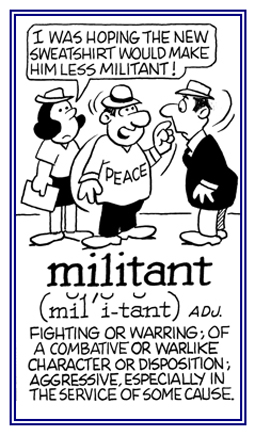
© ALL rights are reserved.
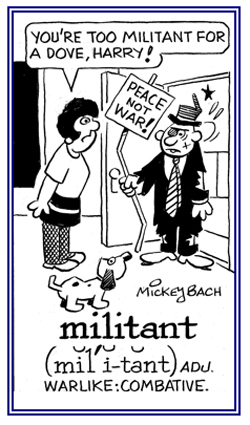
© ALL rights are reserved.

© ALL rights are reserved.
Go to this Word A Day Revisited Index
2. Pertaining to being engaged in warfare: The militant soldiers responded to the rebel attacks with gunfire that resulted in some of the demonstrators being seriously injured or killed.



Go to this Word A Day Revisited Index
so you can see more of Mickey Bach's cartoons.
1. A vile wretch; a villain, a depraved rascal; or a generally malicious and contemptible person: A miscreant robbed an elderly lady after she got off the bus and was walking to her apartment.
2. A disbeliever, a heretic; an infidel: The miscreant, who yelled out that the preacher was a liar and didn't know what he was talking about, was forced out of the church service by two deacons who made sure he could not come back in.
4. Etymology: from Old French mescreant, "heretical, unbelieving, infidel"; from mes-, "wrongly"; from Latin mis-, "wrong" + creant, creire, "belief, to believe"; from Latin credere, "to believe".
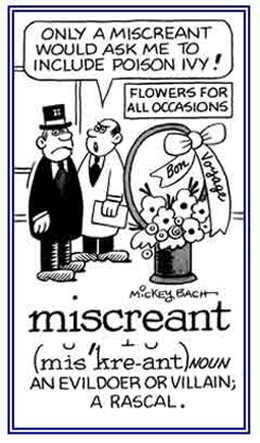
© ALL rights are reserved.
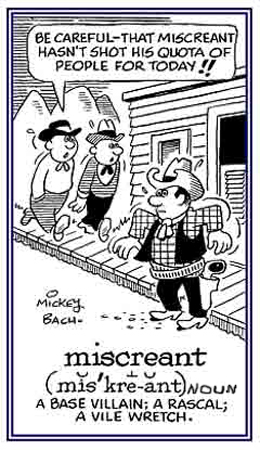
© ALL rights are reserved.
Go to this Word A Day Revisited Index
2. A disbeliever, a heretic; an infidel: The miscreant, who yelled out that the preacher was a liar and didn't know what he was talking about, was forced out of the church service by two deacons who made sure he could not come back in.
4. Etymology: from Old French mescreant, "heretical, unbelieving, infidel"; from mes-, "wrongly"; from Latin mis-, "wrong" + creant, creire, "belief, to believe"; from Latin credere, "to believe".
So, originally a miscreant was an infidel, a heretic, a pagan, or a heathen; literally, being of the “wrong belief”.


Go to this Word A Day Revisited Index
so you can see more Mickey Bach illustrations.
mordant, mordanting, mordanted, mordants
1. Bitingly sarcastic: mordant satire.
2. Incisive and trenchant.
3. Bitingly painful.
4. Serving to fix colors in dyeing, as with a reagent, such as tannic acid, that fixes dyes to cells, tissues, or textiles or other materials.
5. A corrosive substance; such as, an acid, used in etching.
2. Incisive and trenchant.
3. Bitingly painful.
4. Serving to fix colors in dyeing, as with a reagent, such as tannic acid, that fixes dyes to cells, tissues, or textiles or other materials.
5. A corrosive substance; such as, an acid, used in etching.
1. A plant or animal that is different from other plants or animals of the same kind because of a change in the structure of their genes.
2. Etymology: from Latin mutant- "changing"; from the verb mutare, "to change".
2. Etymology: from Latin mutant- "changing"; from the verb mutare, "to change".
1. A medicine or agent that induces or causes diziness and vomiting.
2. Etymology: from Greek nausia, "seasickness, nausea, disgust" literally "ship-sickness," from naus, "ship".
2. Etymology: from Greek nausia, "seasickness, nausea, disgust" literally "ship-sickness," from naus, "ship".
Regardless of its etymology, nauseant never seems to have been applied only to seasickness.


